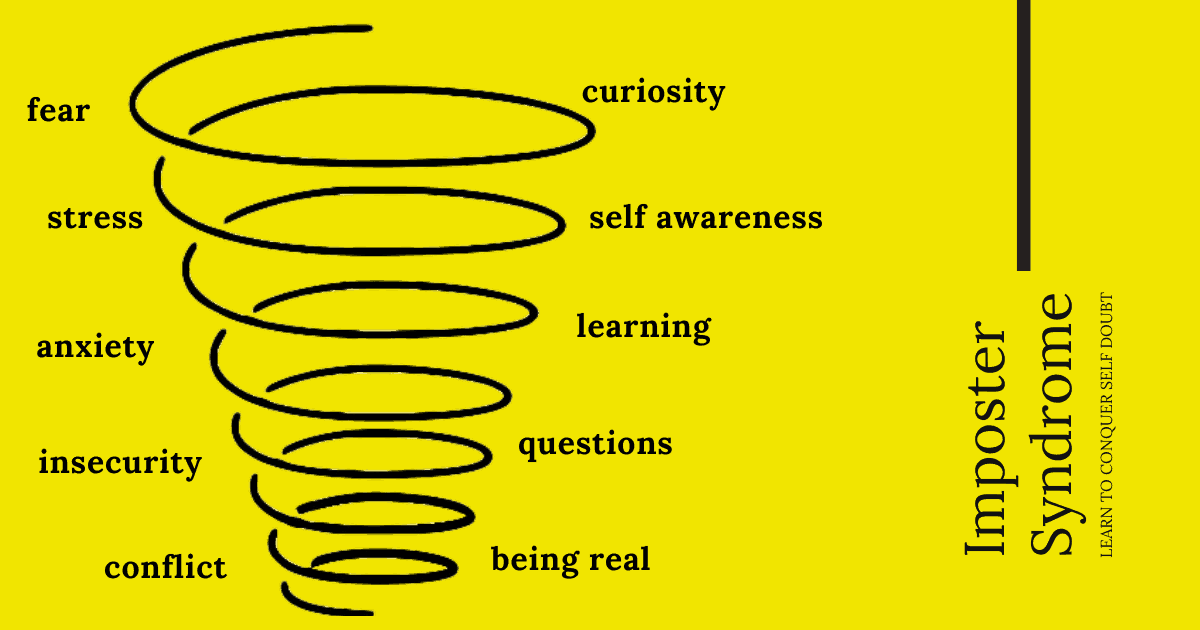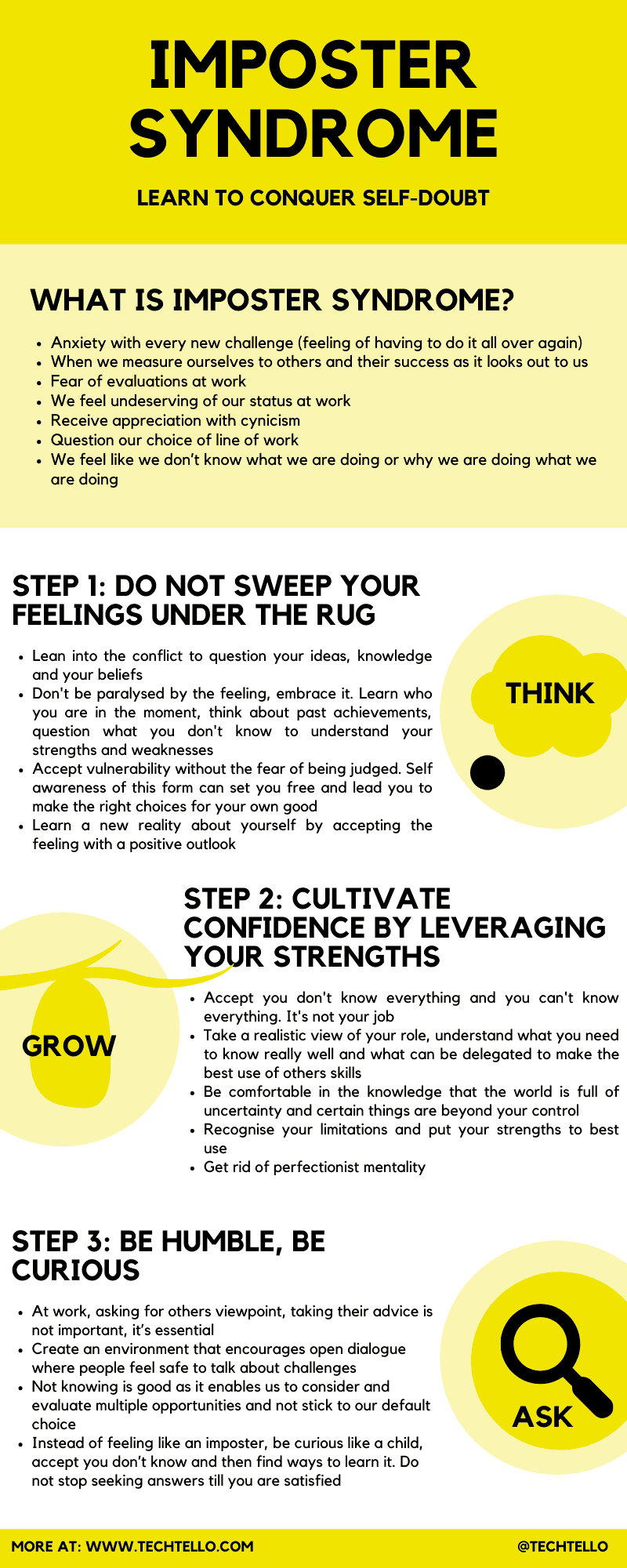Why Imposter Syndrome Isn’t Bad: How to Conquer Self-Doubt

Remember the time when you stepped out of an exam at school thinking you didn’t do so well or the first interview at work where you wondered who are you to evaluate and judge the other person or getting assigned to a shiny new project and nervous about pulling it off or too afraid to raise hand and ask a question with the fear that others will consider you stupid or not worthy of your position.
These crippling thoughts of self-doubt, unwarranted sense of insecurity may stem from multiple sources – expectations of parents or someone we care about, conflicts during life, high stress jobs, workplaces where even small mistakes are criticised. This little voice in our head can fend itself into limiting beliefs, that our ideas are not worthy of other’s attention or that we don’t fit in.
Imposter syndrome or imposter experience (as many like to call it) is but natural and part of being human. Think of it as a feature and learn to manage it instead of considering it a bug and trying to get rid of it.
From The Effective Executive by Peter Drucker
I was on the cusp of leaving my faculty spot at Stanford, betting on a self-created path, and I was scared. “It seems to me you spend a lot of time worrying how you will survive,” said Peter. “You will probably survive.” He continued: “And you seem to spend a lot of energy on the question of how to be successful. But that is the wrong question.” He paused, then like the Zen master thwacking the table with a bamboo stick: “The question is: how to be useful!”
So, you would think if imposter syndrome is so common, it must be widely accepted?
Though most of us have experienced this feeling multiple times in our life, it’s an elephant in the room that no one wants to talk about. The belief that acknowledging this feeling will make us look weak, tarnish our image, sound like a loser makes us experience imposter syndrome in silence.
We burden ourselves with the thoughts, suffering internally with the belief that we are the only ones to feel like an imposter.
Whether there is some reality to it or it’s just a feeling is something only you can find out through self awareness and action. Obsessing over it is not going to make it disappear. Worse, not dealt with properly, imposter syndrome can prevent us from being effective at our jobs and in our life as it creates a mental barrier to realise our full potential.
People who are satisfied or egocentric sometimes live with a false sense of superiority that gives way to wrong judgement and irrational decisions. Such people are limited in their thinking and their accomplishments as they construct a distorted version of their own reality and ignore signals around them telling them a different story.
Dealing with imposter syndrome is not easy and it’s not pleasant, but it’s what inspires us to question our choices, confront our own feelings and think deeply about the underlying root cause. Learning to deal with the feeling of self-doubt can turn anxiety, unworthiness into a desire to do better and strive for more. So, what can we do?
How to achieve more by taking control of self doubt and learning to overcome Imposter Syndrome
Imposter syndrome is not a permanent phenomenon that controls and guides all our actions at work. It is psychological and presents itself in phases of doubt about ourselves, our capabilities in what we can achieve. It can be in the form of:
- Anxiety with every new challenge (feeling of having to do it all over again)
- When we measure ourselves to others and their success as it looks out to us
- Fear of evaluations at work
- We feel undeserving of our status at work
- Receive appreciation with cynicism
- Question our choice of line of work
- We feel like we don’t know what we are doing or why we are doing what we are doing
Let’s learn to embrace imposter syndrome in 3 simple steps:
Do not sweep your feelings under the rug
Conflicts in life are good as they provide a mechanism to question our ideas, our knowledge and our beliefs. Leaning into the conflict can set us on a path of self exploration.
Instead of being paralysed by the feeling, embracing it and learning who we are in the moment, thinking about our past achievements, questioning what we don’t know can help us understand our own strengths and weaknesses.
Self-awareness applied at these moments of vulnerability, accepting them first without the fear of being judged, without worrying about the image we have created for ourselves can set us free and lead us to make the right choices for our own good.
So, be surprised to learn a new reality about yourself by not hiding from this feeling and accepting it with a positive outlook.
Cultivate confidence by leveraging your strengths
We typically obsess over things we don’t know without understanding the things we do well and easily.
We burden ourselves to stick to the image we have created projecting the outward confidence and attitude of “know-it-all” while our inner self struggles to keep up with it. This internal conflict, makes us feel petrified to be out of depth and not experienced enough at our jobs.
Instead of leveraging our strengths and learning about our limitations, we waste time and energy in dealing with this self induced conflict. Building confidence at work requires:
- Accepting we don’t know everything and we can’t know everything. It’s not our job.
- Take a realistic view of our role, understand what we need to know really well (important things that require our expertise) and what can be delegated to make the best use of others skills.
- Be open to learning new things and adapting new ways of doing things by applying growth mindset as opposed to a fixed mindset
- Be comfortable in the knowledge that the world is full of uncertainty and certain things are beyond our control
- Recognise our limitations and put our strengths to best use
- Get rid of perfectionist mentality
Once we learn about ourselves (our strengths and limitations) and accept it, we can then act on it and build the confidence to achieve success at work.
From The Effective Executive by Peter Drucker
Do what you’re made for, yes, but then get better and better; eradicate weakness, yes, but only within strength.
Be humble, be curious
We are all born curious. As children, we ask questions about everything – how, when, where, what, when, who? Adults don’t judge such children of not knowing or subject them to a feeling of lowness. Rather, children who question are appreciated for being curious thinkers.
Yet as we grow, not knowing is considered embarrassing, asking is a sign of weakness. Leaders are expected to know everything. With the belief that vulnerability is for losers, we don’t ask for help.
At work, asking for others viewpoint, taking their advice is not important, it’s essential. Uncover your blind spots by creating an environment that encourages open dialogue where people feel safe to talk about challenges. Not knowing is good as it enables us to consider and evaluate multiple opportunities and not stick to our default choice.
From Charlie Munger – The Complete Investor
I believe in the discipline of mastering the best that other people have ever figured out. I don’t believe in just sitting down and trying to dream it all up yourself. Nobody’s that smart.
Instead of feeling like an imposter, be curious like a child, accept you don’t know and then find ways to learn it. Do not stop seeking answers till you are satisfied.
Recommended Reading
I would love to hear your stories about imposter syndrome at work and how you dealt with it. Do share in the comments below or write to me.

































